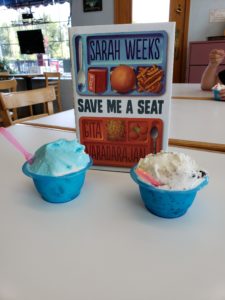Readers, it’s almost October!
Let me pour myself some Harney & Sons Hot Cinnamon Spice Tea. (You can have your pumpkin spice lattes!)
Are you reading along with my kids and me for the Love Your Neighbor Book Club? We read Save Me a Seat for September, and it was a fantastic choice for the start of a new school year. Before I dive into the discussion questions for that book, here are some tips for facilitating a middle school book club.

Book Club Tips
These book club tips all revolve around two central themes: advance preparation and warm fuzzies.
- Pray about your book club. This sounds trite, but I’m dead serious. Pray about the kids the Lord might be sending your way and the books you will choose–what do the kids need to read/think about? Ask for wisdom in choosing books, locations, group members, and facilitating conversation!
- Choose a location wisely. Go there before scheduling your book club. Go there at the same time you plan to hold your book club. Ask yourself:
- Will my book club members feel comfortable here? (middle schoolers are all about ice cream, not so much fancy coffee drinks)
- Can we hear each other? (ahem, I did not anticipate this, but the coffee machines in the background at our gelato/espresso spot were LOUD. We are re-locating next time).
- Is the environment conducive to a group discussion, or will we be spread out at a long, skinny table?
- Is the location easy to access? (both in terms of traffic and in terms of any special needs)
- You can, of course, host a book club at school, in your home, or another “free” spot. We tried ours at home last spring, but it got confusing trying to get RSVPs for snack purposes, and our book club kids are all homeschooled–they enjoy going out somewhere!
- Read the book before choosing it. This seems obvious, but you’d be surprised how tempting it is to simply trust a review you’ve read (even a review from Redeemed Reader!). Ask yourself:
- Are there thematic issues that will spark interesting discussion?
- Will my audience enjoy this book? This is not school with “required reading.” You are going for enjoyment, folks, along with some food for thought.
- Do I enjoy this book? You won’t want to spend the prep time if you don’t enjoy it. Odds are good, if you don’t enjoy it, the kids won’t either.
- Is it a book worth owning? (If not, ask yourself why. You want to pick books for your book club that include at least a few “library builders.” If it’s a “library checkout” sort of book, double check that your local library has a couple of copies so everyone doesn’t have to buy a book.)
- Choose your books with an eye to variety:
- Length: alternate short/long each month
- Reading level: alternate easier/harder each month
- Complexity: some months (particularly those after a holiday or at the beginning of the school year) are better served by books that are more straightforward and easy to talk about. But you want a few months’ books to be complex.
- Subject matter and mood: sports books, history books, books with a cultural focus, funny books, serious books, etc.
- Genre: throw in a graphic novel and/or a novel-in-verse to break it up. Add in a memoir or a narrative nonfiction. Maybe a mystery book.
- Choose a date and time that can be consistent each month. This makes it easy to remember and plan around. Ours is the second Friday afternoon of the month because we’re talking about the second greatest commandment (and we were all free at that time!).
- Publish book list ahead of time–a semester’s worth is nice. This allows families to track down a book, ask their library to order it, or simply pass it back and forth between family members. This also provides for slower readers who want to get a head start or people who choose audio book versions (which take longer to “read”).
Save Me a Seat Discussion Questions
Save Me a Seat is a wonderfully middle-school friendly story told by two authors from two different cultural perspectives. And they just nail it: the reader is in fifth grade with Ravi and Joe. Kids easily pick up on the questions listed below, so this is a fun first choice for kids new to a book club even if they are older than 5th grade.
You don’t have to ask all of these questions; pick and choose based on what seems to get kids talking! And if you are hosting this book club at school or home, consider making one of the treats in the back of the book. My family is very partial to the savory little Indian cookies.
- Most of us have been in Ravi’s situation where we are the new kid on the block (or at church, at school, at scouts, etc.). How many of you have been in Joe’s position where you are the one welcoming in the new kid? What did you do to welcome in the new person? Is there anything you could have done differently?
- If your book club has several people in it that don’t know one another, try playing the get-t0-know-you game on p. 17 of the text (with the Venn diagrams). It’s not an amazing game, kind of teacher-y, but the kids might recognize it from the book and think it’s fun.
- Why does Ravi get sent to the resource room? What about Joe? Do you know people who have either of those struggles? (One is struggling with speaking English as a second language, particularly with the way his accent is confusing to native English speakers; the other has more academic/ADD concerns.) How can we love our neighbors who struggle like this? If you have similar struggles, how would you want people to love you? What feels condescending or mean? [this is a great opportunity to talk about simple things, like slowing down when we’re speaking to a non-native speaker, paying close attention when we’re listening to a non-native speaker, and learning what our friends might do that’s intentional versus unintentional. All of these have to do with thinking of the other person’s needs above our own.]
- Joe plays a clever trick on Dillon near the end of the book, playing off of Dillon’s own sins and meanness of heart. Do you think Joe did the right thing? Is there a different (more biblical) way to approach this sort of conflict? How should we defend ourselves and our friends from bullies? What does the Bible say about our responsibility to our enemies?
- What do you think of the families in the book? Think about Joe’s relationship with his parents and Ravi’s relationship with his parents and grandparents. How do the parents and grandparents of these two boys show their love for their kids? Can you think of ways your own parents and/or grandparents show their love for you? (be sensitive here: if you don’t know the family situations of your book club members, be sure to use more neutral terms–such as “parent” instead of “parents” and “mother or father or grandparent or another person who helps take care of you” type language–for when you are directly asking your book club members about their own families. There are plenty of kids who don’t have loving families, and you may decide to punt on this question altogether!)
- Choose one (or all!) of the quotations below to discuss:
‘This morning in class he tripped me on purpose with his foot and nearly broke my glasses,’ I say. ‘That doesn’t sound like the Joe I know,’ says Miss Frost. ‘Dillon saw him do it,’ I tell her. ‘He told me.’ Miss Frost bites her lip, then says, ‘I wasn’t there, but if he tripped you, he owes you an apology. And you owe him an apology as well, for implying that he might not be as smart as you are. Just because Joe needs help doesn’t mean he isn’t bright. You shouldn’t assume things about a person before you know who they really are.’ ~Ravi’s section, p. 84
Suddenly it dawns on me: I am the Ramaswami of Albert Einstein Elementary School. Curryhead, a loser and the butt of the joke. It seems I am getting a taste of my own medicine. ~Ravi, p. 133 [this is a great quotation to use to talk about reaping what we sow, how position/popularity never give us the “right” to treat others poorly, and more!]
‘It was easy,’ I tell her. ‘These candies have four layers. Most people assume there are only three, but assumptions are often wrong. There is more to them than meets the eye.’ ~Ravi, p. 212
I have always been Amma and Appa’s shining sun, and my grandparents’ pride and joy, but today I have learned something important. Winning is not always about shining the brightest. Sometimes it’s about sharing the light with someone who has been waiting in the shadows all along. ~Ravi, p. 215
Readers, have you read this book with your kids? What other good discussion questions came up when you talked with your kids?
Next up for October for our Love Your Neighbor Book Club: A Long Walk to Water.
Support our writers and help keep Redeemed Reader ad-free by joining the Redeemed Reader Fellowship.
Stay Up to Date!
Get the information you need to make wise choices about books for your children and teens.
Our weekly newsletter includes our latest reviews, related links from around the web, a featured book list, book trivia, and more. We never sell your information. You may unsubscribe at any time.
We'd love to hear from you!
Our comments are now limited to our members (both Silver and Golden Key). Members, you just need to log in with your normal log-in credentials!
Not a member yet? You can join the Silver Key ($2.99/month) for a free 2-week trial. Cancel at any time. Find out more about membership here.


